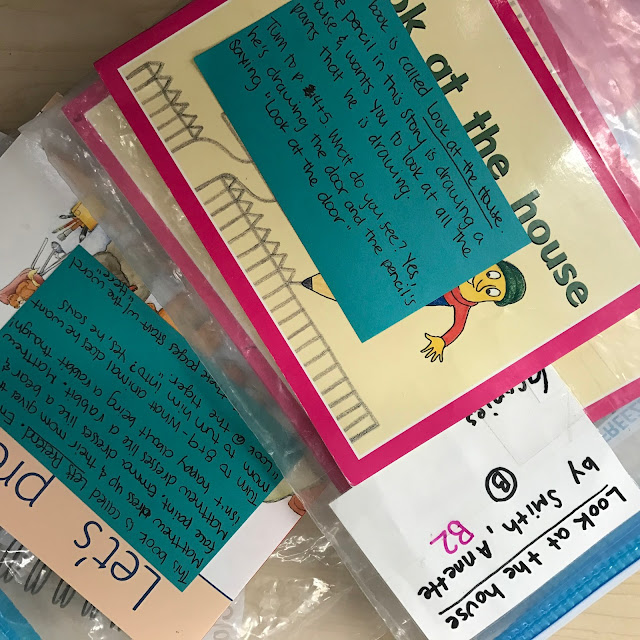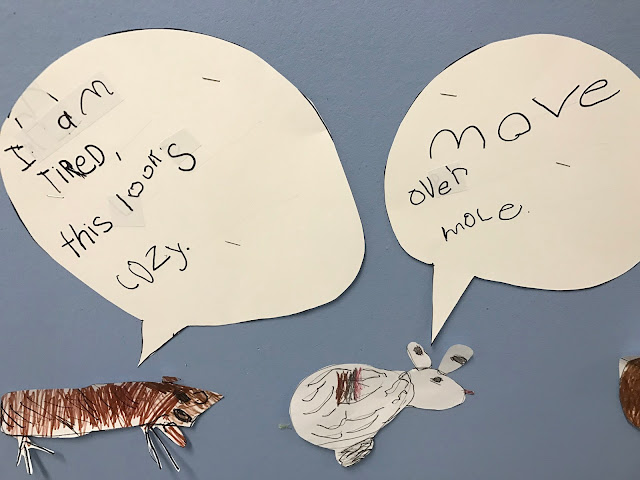teeny tale:
we went to an amazing keynote address by
natalie louise last october. she shared with us (and a huge audience) some of the project's latest thinking around guided reading. this thinking was based on the work of
irene fountas and gay su pinnell. if you ever get the opportunity to hear natalie louise speak we strongly suggest it; she’s captivating and hysterically funny. it felt like she was performing a monologue on the tonight show. her presentation was filled with lots of reminders about best teaching practice and
tiny tips on how we can make our
guided reading stronger.
 |
| kindergartners are shopping independently for books |
tiny tips on guided reading from natalie louis:
• above all else, guided reading needs to be a successful reading experience because it’s work that is done
one level above a child’s independent reading level.
• if you invite children to stretch themselves to the next level you need to make sure it is not a scary situation.
• if a book is too hard, It’s okay to say to yourself,
I messed up and read the book to them.
• before reading with kids look at data.
• the
teacher college word detective book (grade one) shows tiny samples of
running records. natalie was encouraging teachers to take short snippets of running records. she reminded us that we sometimes overwhelm ourselves by taking long running records and spending way too much time analyzing them.
• text choice is the next part of guided reading. what are the most supportive books for that reader? different levels of books will need different levels of teacher support.
• planning a book introduction is important. the teacher needs to do their most
strategic thinking of how you will support these readers.
the book introduction
what kind of support do these readers need?
 |
| we found it helpful to get in the habit of writing our book introductions on post-its |
super small amount of support
(been in the level and are almost independent)
• our book introduction could give a gist:
this book is about a boy who hates broccoli and all his parents keep saying is eat your broccoli. let’s read it to the end to find out what happens
a heavier scaffold
• give a gist of the book and show some key pages to students to help the kids understand the language of the book.
• natalie suggested to tell the kids that books sometimes
talk funny. you may set up the way the
book talks for them.
• for example if we are introducing a heavy patterned story we may tell the kids that the character in the story went to the park and had such a great time that they told their mom all of the things they liked. “
i like the slide (with expression). "
lastly, natalie shared a
teeny tale about working with a child in a guided reading group. during this guided reading group, natalie was coaching a team of primary teachers. while all the teachers were watching this reading session a child was getting stuck on the word WILL. all of the adults watching the child reading, wanted to yell our,
“hey. It’s WILL!!!!” but Natalie made it clear that the teachers could not intervene. she reminded the group of teachers that the point of the lesson is not that the
child is reading the word correctly, the point of the lesson is that
the child is doing the work or learning the word WILL. as soon as we tell the child the word. we take the work away of learning the word WILL.
obviously there are times when you may need to give a child a word during a guided reading lesson but since hearing natalie’s reminder it has made us more comfortable with letting kids get stuck, struggle and do the work!
happy monday!
jessica & laura & melissa



 interactive writing
interactive writing 
